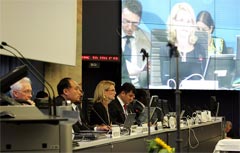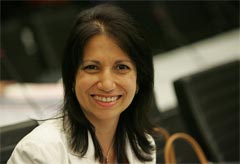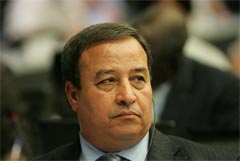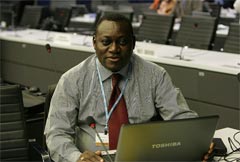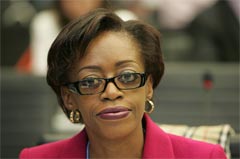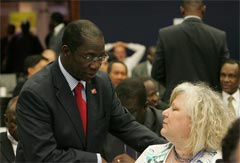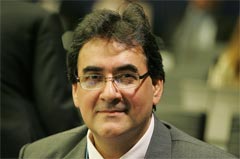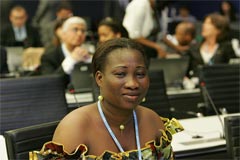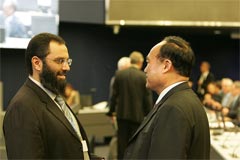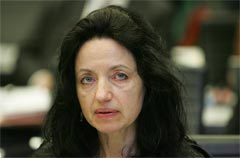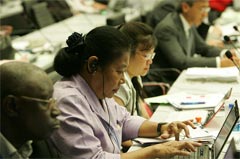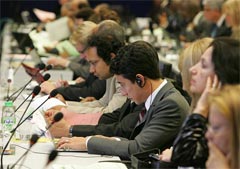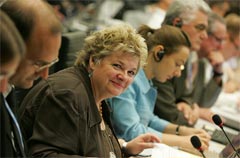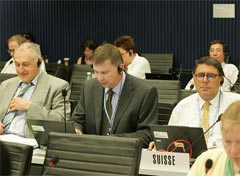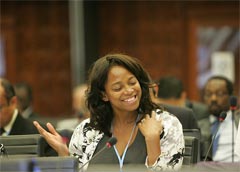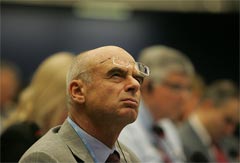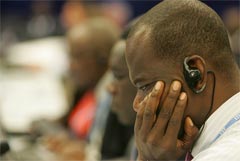
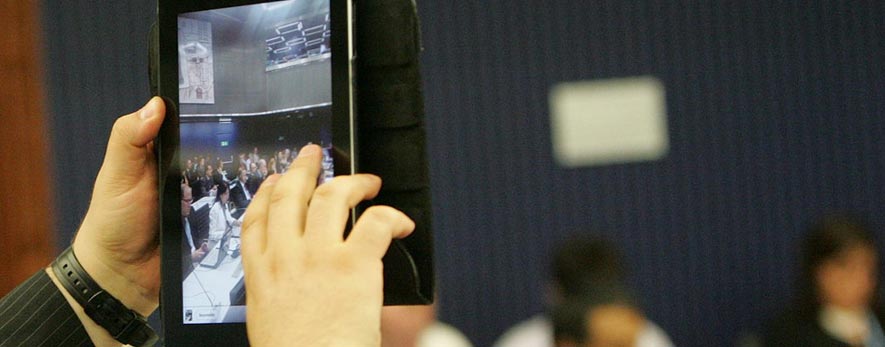
| « Previous | Next » | |||||||||||
| Issue No. 4 | Geneva, 10 July 2012 | |||||||||||
|
|
||||||||||||
CWG-Internet to include stakeholders in open consultationsThe Council has adopted a resolution on the “Modality of Open Consultation for the Council Working Group on International Internet-related Public Policy Issues (CWG-Internet)”. After intense debate, the ad hoc group chaired by Idrissu Haruna, Ghana’s Minister of Communications (see Issue No.2 of the Council 2012 Highlights), reached consensus on the modalities of the open consultations. CWG-Internet will hold online consultations for all stakeholders, the deadline for response being one month before the meeting of the Group. All responses received will be available to the Group on a dedicated webpage of the CWG-Internet website. In this regard:
This consensus text (Document DT/7) was presented by the ad hoc group Chairman to the plenary on Tuesday, 7 July (morning). There was broad agreement on the text, although some councillors wanted to clarify how far openness would go. Both the Chairman of the Council and the ad hoc group Chairman reconfirmed that all responses from open consultations will be publicly available on a dedicated webpage of the CWG-Internet, without passwords. Regarding access to the output of the CWG-Internet, the Council Chairman reminded councillors that the Terms of Reference of the Group, in Council 2011 Resolution 1336 clearly say that the group will “disseminate its outputs throughout ITU’s membership and to all relevant international organizations and stakeholders actively involved in such matters for their consideration in their policy-making processes”. He also clarified that “the summary of the relevant contributions as well as discussions will be made available in accordance with those Terms of Reference”. With this clarification, the milestone resolution specifying the modality for involvement of all stakeholders in the open consultation process of CWG-Internet was approved by the Council, with a round of applause.
WSIS+10 review process warrants a new resolutionThe Chairman of the ad hoc group on WSIS, Professor Vladimir Minkin, reported that the group had developed 14 decisions and had reached consensus on all except one (namely decision 12 in Document DT/6). He called on the Council to decide whether the 14 points should be converted to a resolution. There was general agreement to embody the points in a resolution, although various comments were made. In particular, Algeria and Cuba emphasized the need to preserve the intergovernmental nature of regional meetings, while Burkina Faso and Canada requested an analysis of the financial implications of the WSIS events in terms of activities undertaken in ITU.
The Chairman of the Council ruled that a drafting group would convert the decision points into a resolution.
ITU Internet activitiesAlexander Ntoko (TSB) presented a report (Document C12/28) summarizing ITU’s activities related to Plenipotentiary Conference Resolutions 101: “Internet Protocol-based networks”; Resolution 102: “ITU’s role with regard to international public policy issues pertaining to the Internet and the management of Internet resources, including domain names and addresses”; and Resolution 133: “Roles of administrations of Member States in the management of internationalized (multilingual) domain names”. The Council noted the activities described in the report without comment. It also looked at a proposal from the Russian Federation (Document C12/56) that sought to supplement section 2 of Document C12/28 with information from work carried out by Study Group 11 of the Telecommunication Standardization Sector (ITU-T). Presenting the proposal, the Russian Federation said that ITU now “plays a key role in developing approaches to next-generation telecommunication networks and networks of the future” and that one of its main tasks is “the implementation of testing procedures for telecommunication technologies, protocols and services, including those which operate via the Internet”. The Russian Federation went on to underline that “the rapid development of the Internet and of the software and hardware that facilitate access to the information it contains have significantly boosted the opportunities for providing users with a range of content, including heavy content. Currently, content providers offer their services via the networks of infrastructure operators using the over-the-top (OTT) model.”
Many countries expressed the view that the report (Document C12/28) could not be modified as proposed by the Russian Federation. Instead, they encouraged the Russian Federation to submit the proposal to the upcoming World Telecommunication Standardization Assembly (WTSA-12).
Can ITU protect its name in the expanded domain name system?
The ITU name and logo are protected under international law, especially within the scope of the Paris Convention for the Protection of Industrial Property.
Operational Plans get ringing endorsement
The Council considered and approved the Union’s four-year rolling operational plans for 2013-2016. Radiocommunication Sector (ITU-R)Presenting the draft Operational Plan for the Radiocommunication Sector (Document C12/18), Fabio Leite (BR) underlined that it will serve as a guide for the Bureau. The plan takes into account the decisions of the recently concluded RA-12 and WRC-12, which have defined a new road map for the work carried out by ITU-R and has also been reviewed by the Radiocommunication Advisory Group (RAG) at its meeting in June 2012. The plan, Mr Leite said, marked the start of the application of the revised Radio Regulations as considered and adopted by WRC-12, which defined broader and challenging issues that are now being translated into new strategies. The plan contemplates activities related to preparations for and implementation of WRC-15 as well as for the next WRC following WRC-15. The plan reflects BR’s willingness to intensify cooperation and assistance to the membership, particularly in the areas of spectrum management, transition from analogue to digital broadcasting and effective an efficient use of the digital dividend. Telecommunication Standardization Sector (ITU-T)Reinhard Scholl (TSB) presented the draft Operational Plan for the Telecommunication Standardization Sector for 2013–2016 (Document C12/19). He mentioned that there is also a detailed action plan for the implementation of all the WTSA-08 Resolutions. In addition to ITU-T’s traditionally strong areas such as optical transport, optical and copper access, architecture, quality of service, numbering and addressing, economic and policy questions, security, and emergency communications, ITU-T’s portfolio is being augmented by new areas such as cloud computing, smart grid, home networks, ITS (Intelligent Transport Systems), Internet of Things and Machine-to-Machine communications, ICT and climate change, and telepresence technology. The mentoring programme recently introduced for new delegates to ITU-T study groups aimed at enhancing and enriching their participation has been well received and is now a regular feature. Remote participation is also provided during study group meetings including working party plenaries, at no cost for remote participants. One full or two partial fellowships per administration are awarded to facilitate participation from least developed or low-income developing countries. Great emphasis continues to be placed on collaboration with other relevant bodies. Saudi Arabia pointed out that, for all the operational plans, the “resolves” part should make it clear that the Director has some flexibility in the implementation of the plan. The TSB Director Malcolm Johnson said that such flexibility would help ITU-T to take account of the outcome of WTSA-12 later this year. The Republic of Korea emphasized the importance of ITU-T’s work on bridging the standardization gap (BSG) and confirmed that it would continue to support this work. TSB Director Malcolm Johnson thanked the Republic of Korea for its strong support to the work of ITU-T, in particular to the annual BSG workshop. The TSB Director further thanked especially Korea Communications Commission (KCC) for having contributed to the BSG fund. Senegal commented that holding workshops in developing countries alone is not sufficient to bridge the standardization gap. The TSB Director said that what was important was the participation of delegates from developing countries in the standardization meetings. Since 2007, a total of 41 countries have participated in ITU-T that did not participate in 2007, including 16 countries during 2011 that had never participated before. All ITU-T study groups have seen new members participate in their work, especially from developing countries. Remote participation was provided during all study group meetings, including working party plenaries, at no cost for remote participants (using a call back option). One full or two partial fellowships per administration are awarded to facilitate participation of least developed or low-income developing countries in study groups, TSAG and WTSA. Furthermore, some companies from selected low-income countries have taken up the possibility to join ITU-T at a reduced membership fee of just below CHF 4,000, instead of CHF 31,800. TSB continues to fund an increasing number of handbooks, written by standards experts of the study groups. Based on these handbooks, TSB has also organized tutorials which were given by the standards experts for implementers and users of the standard(s). All of this helps delegates from developing countries to bring their requirements into the standardization process and to learn its rules.
Burkina Faso said it assumed that KPMG’s recommendations on Conformance and Interoperability would also be taken into account. Telecommunication Development Sector (ITU-D)The 2013-2016 operational plan in Document C12/20 was presented by Yury Grin (BDT). In a nutshell, the plan provides the framework within which the mission and objectives of ITU-D will be implemented during 2013-2016. It encompasses all relevant information on resource requirements, expected results and key performance indicators. In addition, key risk factors relating to objectives and outputs are outlined. In developing the plan, BDT has sought to respond to the expectations and priorities expressed by ITU-D membership regarding the Sector’s transparent, efficient, accountable and results-based management.
Many countries took the floor to commend BDT for the improvements both in terms of the clear presentation and the operational content. The predominant role of regional initiatives and the high priority given to these initiatives was confirmed by the BDT Director. The draft resolution in Document C12/20 was approved with minor changes to ensure that flexibility is given to the BDT Director when implementing the operational plan. The plan had also been reviewed by the Telecommunication Development Advisory Group at its 2012 session. General Secretariat
ITU Deputy Secretary-General Houlin Zhao presented the General Secretariat’s operational plan for 2013-2016 in Document C12/17 (Rev.1).The document was prepared on the basis of the General Secretariat’s strategic goal, objectives and outputs, as defined in the strategic plan for 2012-2015, and is aligned with the ongoing implementation of results-based management in ITU. It specifies the way forward for achieving effectiveness and efficiency in the planning, management, coordination and delivery of services to support the membership of the Union, ensuring the implementation of the financial and strategic plans of the Union and coordinating inter-sectoral activities as identified in ITU basic texts. Mr Zhao explained that as a result of the creation of the Financial Management and Human Resources Management Departments from the former Administration & Finances Department, there are seven organizational units in Part 3 of the operational plan, as compared to the six objectives in Part 2. The Council was requested to review, in detail, the General Secretariat’s operational plan and to adopt the draft resolution in the annex to Document C12/17 (Rev.1). One councillor pointed to the need to ensure coordination between Sectors and the General Secretariat in order to avoid duplication. This was noted, and the Council then approved the operational plan and adopted the associated draft resolution with the same modification in the wording of the “resolves” as for the Sectors. Strengthening ITU’s regional presenceKarim Boussaid (BDT) presented Document C12/25, describing ITU’s efforts to strengthen its regional presence through empowerment of field offices, internal procedures, regional reporting and accountability, standardization and rationalization of staffing, and strengthening cooperation with regional telecommunication organizations.
Many countries took the floor to express their appreciation for the efforts made in the regional offices by the secretariat and the Director of BDT. Six regional telecommunication organizations to participate in the ITU Council as observersIn the interests of strengthening ITU’s cooperation with regional telecommunication organizations, the Russian Federation had proposed revisions to Council Decision 519, which establishes the procedure for the participation of Sector Members. Initially, the proposal (Document C12/57) had raised questions notably on the exact definitions of “participation” and “observer”. But in the end, the proposed revisions were approved. Now, the principal regional telecommunication organizations can participate in sessions of the ITU Council as observers with the same rights as Sector Member obervers. These six organizations are: the Asia-Pacific Telecommunity (APT); the European Conference of Postal and Telecommunications Administrations (CEPT); the Inter-American Telecommunications Commission (CITEL); the African Telecommunications Union (ATU); the Council of Arab Ministers of Telecommunication and Information represented by the Secretariat-General of the League of Arab States (LAS); and the Regional Commonwealth in the field of Communications (RCC).
From Rio+20: The Future We WantITU Deputy Secretary-General Houlin Zhao presented Document C12/75 and Information Document C12/INF/15, which summarize the outcome of the United Nations Conference on Sustainable Development (Rio+20), provide an analysis of this outcome, and highlight ITU’s activities and contribution to Rio+20. The Rio conference ended with the approval of the outcome document entitled “The Future We Want”, which defines the principles and elements that will guide the sustainable development agenda in the coming years. “The Future We Want”, includes a positive outcome for ITU, acknowledging as it does the contribution of information and communication technologies (ICT) in promoting knowledge exchange, technical cooperation and capacity building for sustainable development. The report also highlights the need to work towards improved access to ICT, in particular to broadband networks and services. Mr Zhao pointed out that the Rio+20 Conference also invited all stakeholders to advance the sustainable development agenda through the integration of economic, social and environmental policies. He ended his remarks by congratulating the host country Brazil for the success of the conference and commended the country’s Ministry of Communications for co-organizing a high-level event on “Broadband for smart and sustainable societies” during Rio+20. Brazil presented its Document C12/82, which highlights the importance of supporting implementation of the measures included in “The Future We Want”, in particular promoting the role of ICT in sustainable development. This document contains a draft resolution that seeks to initiate a process to further integrate the main principles included in “The Future We Want” into ITU´s activities.
Canada, Saudi Arabia and Mexico made comments to refine this draft resolution. Canada in its intervention spotlighted the results of the 7th ITU Symposium on ICT, the Environment and Climate Change, held on 29-31 May 2012 in Montreal, Canada. This symposium issued a Declaration that encourages manufacturers of devices using ICT to make their products more easily upgradable, so that entire devices do not need to be replaced. The call to promote a life cycle approach in the design of ICT (eco-design) also means taking more account of how components in a device can be recycled. Reducing e-waste, and providing incentives and encouragement for e-waste take-back schemes, are just some of the enablers being promoted. Canada suggested that a reference to this outcome should be incorporated in the draft resolution to be adopted by the Council.
Date and duration of Council 2013
The Council has decided that it will hold its next session from 11 to 21 June 2013. This decision was taken following presentation of Document C12/2 by Elaine Baron. Not an official document – For information only. |
|
|||||||||||
